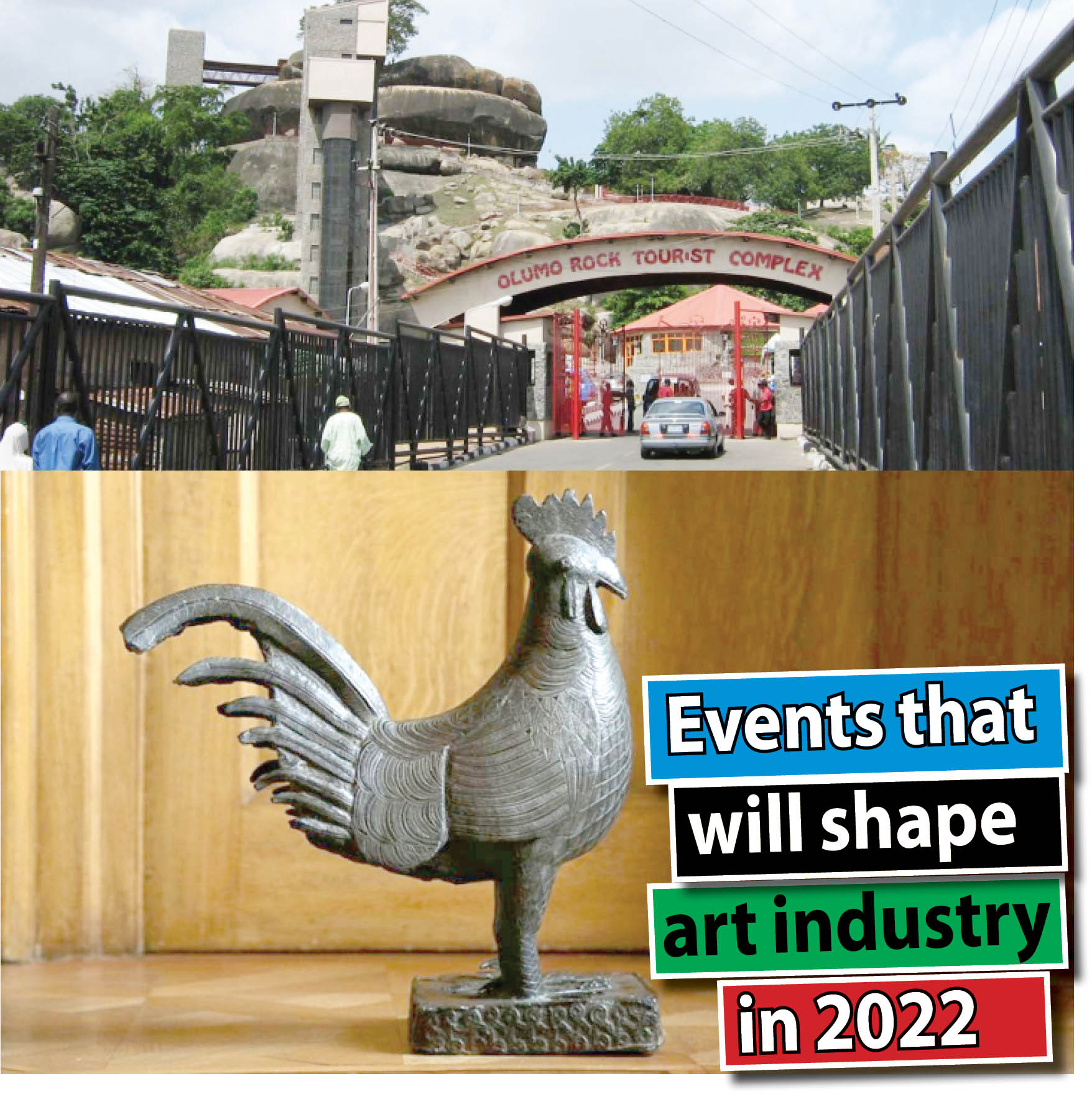The art industry witnessed yet another year filled with triumphs in 2021 despite challenges. While the industry is yet to fully recover from the COVID-10 pandemic of 2020 due to some restrictions in 2021, stakeholders in the industry will hope to experience a better 2022.
Return of looted Benin artefacts
This was a significant occurrence in the art industry globally. Though a major breakthrough for Nigerians, it is of more importance to Art history globally. The return of the looted Benin artefacts followed years of advocacy from and outside the country.
The Jesus College of the University of Cambridge set the pace for other institutions and governments with the return of looted Benin artefacts. The two repossessed bronze artefacts are Cockerel, “Okpa” and an ancestral head, “Uhunwun Elao” from Jesus College, Cambridge, England and University of Aberdeen, Scotland, respectively.
Activists and artists globally will be happy to see their efforts pay off, regardless of the number of artefacts already returned.
The deed of transfer of the looted artefacts was signed between the Benin Kingdom and the United Kingdom.
With over 145 artefacts looted from the palace in 1897 during the British invasion yet to be returned, 2022 could mark the return of some, if not all of the looted artefacts as other countries, including Germany, have made known their desires to return the artefacts to Nigeria.
The artefacts helped in propagating the popularity of the Benin Kingdom and brought the limelight to the glorious past of the Benin people. The artefacts also represent the culture, tradition and identity of the Benin people and Nigeria.
The looted artefacts made in the 13th century yet to be returned include brass plaques, bronze figures, carved ivory tusks, musical instruments, weaving equipment, jewellery and ceramic and coral objects.

In-person exhibitions, festivals return
The art industry was expected to recover from the 2020 COVID-19 pandemic lockdown in 2021. Some exhibitions and festivals did not hold due to restrictions. The recovery, however, continues in 2022.
Many people in the art industry will remember 2020 for the exhibitions and festivals that were never held, shows that were cancelled and trips that were put off. Last year brought some recoveries, but in 2022, artists shall hope to build on the momentum to improve their lot, especially with the aid of technological advancement.
The lockdown opened up a new vista in the art industry, with people embracing technology to drive their works during the lockdown.
Exhibitions and art festivals are now held virtually and physically, a lesson learnt during the year 2020 lockdown.
The 2021 edition of the Beeta Arts Festival, titled, ‘Re-imagine,’ was held virtually and physically in Abuja, leading to a convergence of African arts with presentations from Kenya, Uganda, Mauritius, Ethiopia, Egypt and Tunisia.

More festivals are expected to take a similar format in 2022, transiting to a borderless pool of ideas generation to the benefit of the stakeholders in the industry.
A Benue-based artist, Desrey-Hope Okpanachi, also expressed hope that art would dominate in 2022, adding her desire for people to see art better, appreciate it better and be better aware of its importance and contribution to the society.
“This will keep artists sane to some great degree. I hope for more support and appreciation and contribution from the public. So as artists we can be inspired to stay resilient and speak what we must,” she said, adding that Nigerian artists should be supported and encouraged.
Chike Emembo, an Abuja-based art entrepreneur, corroborated Okpanachi in a recent interview with Daily Trust on Sunday. Emembo, who is also the Federal Capital Territory (FCT) branch chairman of the Society of Nigerian Artists (SNA), said institutions could help the artists.
“Artists do not mind committing hours to their works. I have a passion to see people succeed in this art we are doing. You do not want to leave a bad image for upcoming generations,” he said, urging artists to explore a means of turning their passion into wealth.
Is it the year tourism strives in Nigeria?
Nigeria has more than 15 museums and more than 40 tourist centres. The Osun-Osogbo Sacred Grove and Sukur Cultural Landscape are recognised by the United Nationals Educational, Scientific and Cultural Organisation (UNESCO) as world heritage centres.
A world heritage site is a unique landmark, which is geographically and historically identifiable, and has special cultural or physical significance with legal protection by the international convention administered by UNESCO.
Fourteen sites in Nigeria, including Oban Hills, Niger Delta Mangroves, Gashaki-Gumpti National Park, Idanre Hill, Alok Ikom Stone Monoliths and Lake Chad Cultural Landscape are on the tentative list of the UNESCO world heritage centre. Despite the number of tourist attractions, tourism is yet to contribute significantly to Nigeria’s Gross Domestic Product (GDP).
The United Nations Development Programme said Africa had the world’s second fastest growing tourism sector in 2019, adding that 70million international tourists visited Africa, and tourism brought about US$170billion to the continent’s gross domestic product in 2019.
With the reappointment of Otunba Segun Runsewe as the director-general of the National Council for Arts and Culture (NCAC), and Mr Folorunso Coker as director-general, Nigeria Tourism Development Corporation (NTDC) by President Muhammadu Buhari in 2021, more would be expected from them in transforming the sector.
Top government agencies must find ways of transforming the country’s tourism potentials to tangible benefits to the people. The collaboration of these agencies, including the National Commission for Museums and Monuments and the National Gallery of Art, is crucial to turning tourism into the ‘new oil’ in Nigeria.

 Join Daily Trust WhatsApp Community For Quick Access To News and Happenings Around You.
Join Daily Trust WhatsApp Community For Quick Access To News and Happenings Around You.


